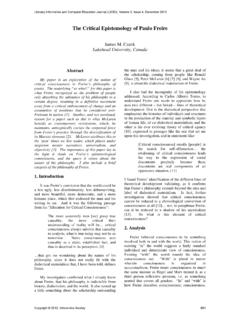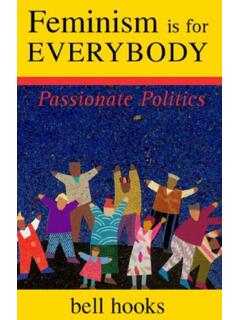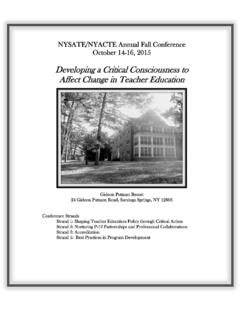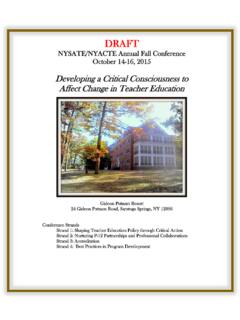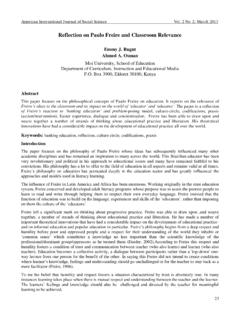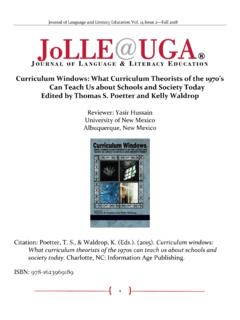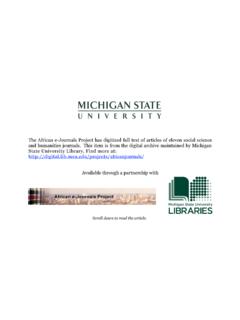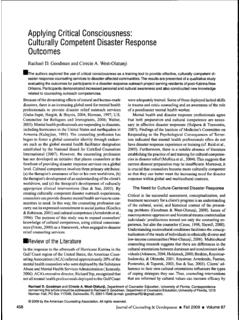Transcription of PEDAGOGY of the OPPRESSED - commons.princeton.edu
1 PAULO FREIRE. PEDAGOGY . of the OPPRESSED ;. 30TH ANNIVERSARY EDITION . Translated by Myra Bergman Ramos With an Introduction by Donaldo Macedo . A continuum I f N E W YORK LONDON. 2005. The Continuum International Publishing Group Inc 15 East 26,h Street, New York, NY 10010. The Continuum International Publishing Group Ltd The Tower Building, 11 York Road, London SE1 7NX. Copyright 1970, 1993 by Paulo Freire Introduction 2000 by Donaldo Macedo All rights reserved. No part of this book may be reproduced, stored in a retrieval system, or transmitted, in any form or by any means, electronic, mechanical, photocopying, recording, or otherwise, without the written permission of The Continuum International Publishing Group Inc.
2 Printed in the United States of America Library of Congress Cataloging-in-Publication Data Freire, Paulo, 1921- [Pedagogia del oprimido. English]. PEDAGOGY of the OPPRESSED / Paulo Freire ; translated by Myra Bergman Ramos ; introduction by Donaldo Macedo. 30th anniversary ed. p. cm. Includes bibliographical references. ISBN 0-8264-1276-9 (alk. paper). 1. Freire, Paulo, 1921- 2. education Philosophy. 3. Popular education Philosophy. 4. critical PEDAGOGY . I. Title. P4313 2000. *5 dc21 00-030304. To the OPPRESSED , and to those who suffer with them and fight at their side Contents Publisher's Foreword 9.
3 Introduction to the Anniversary Edition b y DONALDO MACEDO 11. Foreword by RICHARD SHAULL 29. Preface ^ 35. Chapter 1 43. The justification for a PEDAGOGY of the OPPRESSED ; the contradiction between the oppressors and the OPPRESSED , and how it is overcome;. oppression and the oppressors; oppression and the OPPRESSED ;. liberation: not a gift, not a self-achievement, but a mutual process. Chapter 2 71. The "banking" concept of education as an instrument of oppression . its presuppositions a critique; the problem-posing concept of education as an instrument for liberation -its presuppositions; the "banking" concept and the teacher-student contradiction; the problem-posing concept and the supersedence of the teacher- student contradiction; education : a mutual process, world-mediated.
4 People as uncompleted beings, conscious of their incompletion, and their attempt to be more fully human. 8 CONTENTS. Chapter 3 87. Dialogics the essence of education as the practice of freedom;. dialogics and dialogue; dialogue and the search for program content; the human-world relationship, "generative themes," and the program content of education as the practice of freedom; the investigation of "generative themes" and its methodology; the awakening of critical consciousness through the investigation of "generative themes"; the various stages of the investigation.
5 Chapter 4 125. Antidialogics and dialogics as matrices of opposing theories of cultural action: the former as an instrument of oppression and the latter as an instrument of liberation; the theory of antidialogical action and its characteristics: conquest, divide and rule, manipulation, and cultural invasion; the theory of dialogical action and its characteristics: cooperation, unity, organization, and cultural synthesis. CHAPTER. 2. A careful analysis of the teacher-student relationship at any level, inside or outside the school, reveals its fundamen . tally narrative character.
6 This relationship involves a nar . rating Subject (the teacher) and patient, listening objects (the students). The contents, whether values or empirical dimensions of reality, tend in the process of being narrated to become lifeless and petrified. education is suffering from narration sickness. The teacher talks about reality as if it were motionless, static, compartmentalized, and predictable. Or else he expounds on a topic completely alien to the existential experience of the students. His task is to "fill" the students with the contents of his narration.
7 Contents which are detached from reality, disconnected from the totality that engendered them and could give them significance. Words are emptied of their concreteness and become a hollow, alien . ated, and alienating verbosity. The outstanding characteristic of this narrative education , then, is the sonority of words, not their transforming power. "Four times four is sixteen; the capital of Para is Belem." The student records, memorizes, and repeats these phrases without perceiving what four times four really means, or realizing the true significance of "capital".
8 In the affirmation "the capital of Para is Belem," that is, what Belem means for Pard and what Para means for Brazil. Narration (with the teacher as narrator) leads the students to 72'PAULO FREIRE. memorize mechanically the narrated content. Worse yet, it turns them into "containers," into "receptacles" to be "filled" by the teacher. The more completely she fills the receptacles, the better a teacher she is. The more meekly the receptacles permit themselves to be filled, the better students they are. education thus becomes an act of depositing, in which the stu- dents are the depositories and the teacher is the depositor.
9 Instead of communicating, the teacher issues communiques and makes de- posits which the students patiently receive, memorize, and repeat. This is the "banking" concept of education , in which the scope of action allowed to the students extends only as far as receiving, filing, and storing the deposits. They do, it is true, have the opportunity to become collectors or cataloguers of the things they store. But in the last analysis, it is the people themselves who are filed away through the lack of creativity, transformation, and knowledge in this (at best) misguided system.
10 For apart from inquiry, apart from the praxis, individuals cannot be truly human. Knowledge emerges only through invention and re-invention, through the restless, impatient, continuing, hopeful inquiry human beings pursue in the world, with the world, and with each other. In the banking concept of education , knowledge is a gift bestowed by those who consider themselves knowledgeable upon those whom they consider to know nothing. Projecting an absolute ignorance onto others, a characteristic of the ideology)of oppression, negates education and knowledge as processes of inquiry.
